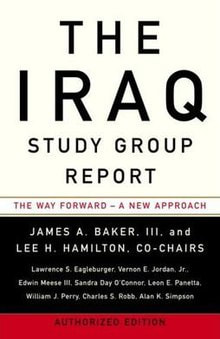|
The Iraq Study Group Report
by the congressional Iraq Study Group Published in December 2006 160 Pages Thibault’s Score: 5/5 This powerful document, in light of the last decade, how arrogant, ignorant, and narrow-minded the United States government was during the Iraq war. The Iraq Study Group (ISG) Report was a bipartisan report commissioned by congress to assess the state of the Iraq war as of December 2006. It addresses growing concerns of a possible civil war in Iraq, and recaps lessons learned from the 2003 invasion of the country, foreshadowing the rise of ISIS. I wanted to read this report to better understand how the U.S. government tackles and thinks about modern military issues, in light of my studies of modern warfare. I learned a lot by reading the report, and strongly recommend it. ISIS didn’t come out of the blue. The government knew exactly what would happen: “A humanitarian catastrophe could follow as ore refugees are forced to relocate across the country and the region. Ethnic cleansing could escalate.” […] “A chaotic Iraq could provide a still stronger base of operations for terrorists who seek to act regionally or even globally.” Rare but important facts are occasionally reported by the ISG. They explain that while the surge, Bush’s plan to increase troops, was “crucial security in Iraq,” “the results of Operation Together Forward II [were] disheartening. Violence in Baghdad - already at high levels - jumped more than 43 percent between the summer and October 2006.” The report is written in a highly formal political manner, heavily saturated with newspeak. It is masked with a veneer of bipartisanship and political neutrality, describing themselves as writing a “consensus report” in the “spirit of generosity and bipartisanship.” Travesties like the occupation government established by the Americans is “a democratically elected government that is broadly representative of Iraq’s population.” America’s desire for a strong centralized government for Iraq becomes a “commitment to national reconciliation.” In another case, the report states that “there must be a renewed and sustained commitment by the United States to a comprehensive Arab-Israeli peace on all fronts.” I found the vague use of the word “commitment” to be amusing: it is one of those meaningless but pleasant sounding words politicians love to use to avoid naming specifics. The tone which the ISG used to describe the Iraqis almost makes it sound like they believe that the Iraqi population is too stupid to make its own decisions, and must rely on the U.S. government. Repeated remarks by the ISG suggest that Sunnis and Kurds need American protection, and don’t know what’s good for them. When talking about the Sunnis, the authors write “they [the Sunnis] have opposed the presence of U.S. forces in Iraq but need those forces to protect them against Shia militias.” The ISG asserts that the Sunnis need America to “protect” them, and assume that they know better than the Sunnis. This begs the question of whether a distant foreign government thousands of miles away or local Sunnis who have the advantage of understanding local culture, history, factions, languages, and politics can make better decisions. The ISG explains away the Sunni’s decision making advantages by writing ““They [the Sunnis] remain angry about U.S. decisions to dissolve Iraqi security forces and to pursue ‘de-Baathication’ of Iraq’s government and society.” The Sunnis didn’t want America’s protection, we ignored them, and they formed ISIS. The same condescending and anti-democratic tone was used when describing the Kurds. “The Kurds have secured a large autonomous Kurdish region in the north, and have achieved a prominent role for Kurds within the national government. […] Leading Kurdish politicians told us they prefer to be within a democratic federal Iraqi state because an independent Kurdistan would be surrounded by hostile neighbors, however a majority of Kurds favor independence.” This is a clear case of the U.S. ignoring the democratic mandate of the Kurdish people, and siding with politicians whom they cherrypick. If they had granted Kurds independence, the situation would be far less chaotic today. The report remarks that “one senior American general commented that the Iraqis ‘still do not know what kind of country they want to have.’ Yet many of Iraq’s most powerful and well-positioned leaders are not working toward a united Iraq.” It isn’t that Iraqis don’t know what they want. Iraqis are very clear: they want to break up the country, but the ISG isn’t listening. Iraq isn’t a real country which corresponds to ethnic, geographical, linguistic, religious or cultural barriers. It is a construct which was created by the British during decolonialization. Iraqis have made it very clear what they want, but the ISG won’t listen. For example, “when our Study Group visited Iraq, the leader of the Kurdish region ordered the lowering of Iraqi flags and the raising of Kurdish flags.” Finally, the report analyzes 4 perceived solutions: precipitating withdrawal, staying the course, more troops for Iraq, and devolution of power to three regions. The ISG concludes that all of these solutions are problematic, and instead suggests “a new approach.” Instead, they outline a detailed plan to raise international support to solve the problems (AKA more Western governments intervening), while completely ignoring the simple demand of the Iraqis themselves: to leave the country and its people to its own devices. The worst part is that this document reveals that the U.S. government could have easily made all of the right decisions, and prevented ISIS, if only they had listened to the demands of the local population. You can read the ISG Report here for free: http://www.iraqsolidaridad.org/2006/docs/gei-1.pdf
0 Comments
Leave a Reply. |
Thibault SerletMost of my articles are book reviews, but I also write about many other topics. Archives
December 2023
Categories |

 RSS Feed
RSS Feed